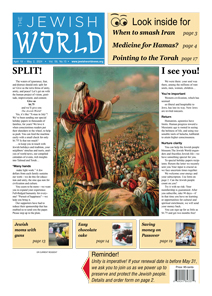By BEN COHEN (JNS)
“When oh, we all start arguing the history of the Jews,” sing LCD Soundsystem in “Call the Police,” their hit single from 2017, “You got nothing left to lose/And it gives me the blues.”
The lyrics are a nod to the idea that a fixation with Jews—what they have done, what they do and what they are apparently capable of—is the last intellectual refuge of the scoundrel. When the song was released, the immediate reference for that line was the growing and bitter polarization in America, but to my mind, it’s a valid observation in other contexts as well.
Like the manner in which the Holocaust has been shamefully manipulated and distorted in the context of Russia’s brutal invasion of Ukraine, now on the cusp of its second year.

Ovation For Nazi?
A brief overview of the widely reported recent events is in order. Ukraine’s Jewish President, Volodymyr Zelenskyy, recently addressed the Canadian parliament in Ottawa. One of the members of the audience was the recipient of a warm standing ovation after he was introduced as “a Ukrainian hero, a Canadian hero” by Speaker of the House of Commons Anthony Rota—was 98-year-old Yaroslav Hunka, who had reportedly fought for Ukraine’s independence during World War II. Only it turned out that Hunka wasn’t a hero but very possibly a war criminal who had served with the First Ukrainian Division, otherwise known as the 14th Waffen Grenadier Division of the Nazi SS.
Once Hunka’s true identity was revealed, the fallout was pretty swift. After initially resisting calls to resign, Rota eventually relented and quit his post, while Canadian Prime Minister Justin Trudeau and Foreign Minister Mélanie Joly offered shamefaced apologies. “It was a horrendous violation of the memory of the millions of people who died in the Holocaust,” said Trudeau, while Joly called the spectacle “an embarrassment to Canadians.”
P.M. Ignores History, Facts
Yet as the opposition and Canadian Jewish groups both pointed out, the remorse, however genuine, doesn’t explain how such a ghastly decision was made and implemented. In that light, Trudeau’s claim that the fault was essentially Rota’s (because it was the former speaker who extended the invitation to Hunka) seems almost cowardly. After all, the prime minister of Canada should be aware that among the more than 1 million people of Ukrainian descent in his country, there are a significant number of apologists for crimes committed by Ukrainians during the war against Jews, Poles and anti-Nazi resistance fighters. Trudeau should also consider that since Canada provided a haven to many of these criminals after the war, the appearance of a nonagenarian Ukrainian on a VIP guest list should at the very least have triggered some due diligence on the part of his office.
The scandal also raises deeper questions about how the history of the Jews in that part of the world, and especially the Holocaust that descended upon them, should be presented in the context of the region’s current turmoil. Ukraine is among the grimmer examples of the Nazi slaughter of Jews, with nearly 1 million executed by mobile firing squads—the “Holocaust by bullets” some call it—and up to 1.6 million exterminated overall, often with the active assistance and participation of Ukrainian collaborators.
As Yad Vashem, Israel’s national memorial to the Holocaust, summarizes it: The “murder of Ukraine’s Jews was mostly carried out by the Einsatzgruppen (the special mobile units that shot Jews) and SD (Nazi intelligence service). They were helped by Ukrainian auxiliaries who gathered the Jews, guarded them, and in many instances, participated in their killing. Those who sheltered Jews were in mortal danger from the Germans as well as from some of their neighbors. Despite the danger, there were individuals and sometimes entire villages who offered Jews shelter.”
Gift To Russia
There is no excuse for downplaying or ignoring this history, even if it’s in the name of an ostensibly noble cause, like supporting Ukraine’s present resistance to Moscow’s attempts to wipe it from the map. In fact, doing so actually weakens the case because it suggests that Ukrainians and their supporters want to cover up the less savory aspects of their country’s past, and is thus a gift for Russian propaganda.
The Hunka scandal was, in that sense, a real gift for the Russians in their quest to persuade a skeptical world that Ukraine is run by neo-Nazis. And without giving any quarter to Vladimir Putin’s regime, it’s important to understand Ukraine’s wartime history in all its complexity and without any whitewashing. Yes, some people will argue that the record of collaboration with the Nazis makes Ukraine unworthy of support 80 years later—logically and morally, an argument that is full of holes—but sanitizing that history is hardly the answer to them.
Holocaust Exploitation
It further obscures the fact that the Russian regime constantly instrumentalizes and exploits the Holocaust and has been doing so since the last years of Stalin’s dictatorship. The Communist Party’s pet historians stamped upon any accounts of the Holocaust that explained it for what it was—a war of mass extermination against the Jews—in favor of a revised account that substituted the critical word “Jews” with “Soviet citizens.” The only time they were prepared to acknowledge the Jewish character of the Holocaust was when they used it as a stick to beat the State of Israel, with official Soviet propaganda depicting Israeli leaders as Nazis who had learned their trade from their own murderers.
They are still doing it. Recently, Maria Zakharova—the Russian foreign ministry’s spokesperson who once opined that if you wanted to understand how Donald Trump won the 2016 U.S. election, “you have to talk to the Jews”—said she wished that “the ancestors of the current Israeli elites knew that their direct descendants were sponsoring a regime that glorifies their murderers and the ideology of the Holocaust.” What was the trigger for this ire? A battery of Israeli anti-aircraft missiles supplied to Ukrainian forces? A delivery of tanks? No. Zakharova was angered by the speech to the International Atomic Energy Agency (IAEA) by Israeli atomic chief Moshe Edri, in which he confirmed that Israel had supplied Ukraine with equipment to safeguard its Zaporizhzhia nuclear plant—the scene of heavy fighting—from a potentially catastrophic accident that would reverberate well beyond Ukraine’s borders.
The lesson here is clear: As Jews, we have to vocally and confidently counter Ukrainian revisionism without giving succor to the present-day Russian foes of an independent, democratic Ukraine. It sounds easy, but it isn’t. Too many countries have shown themselves willing to prettify their Holocaust-era records in order to advance their agendas today, often couching their revisionism in language sympathetic to Jewish suffering. We have been warned.








